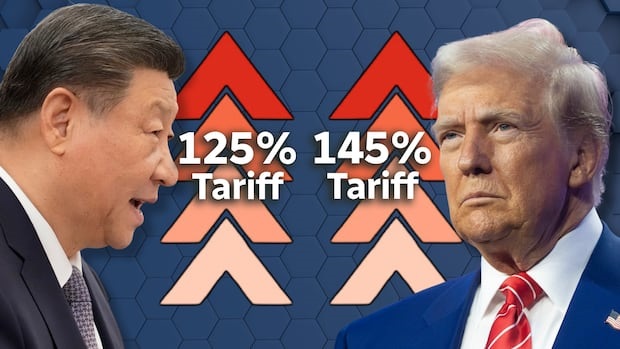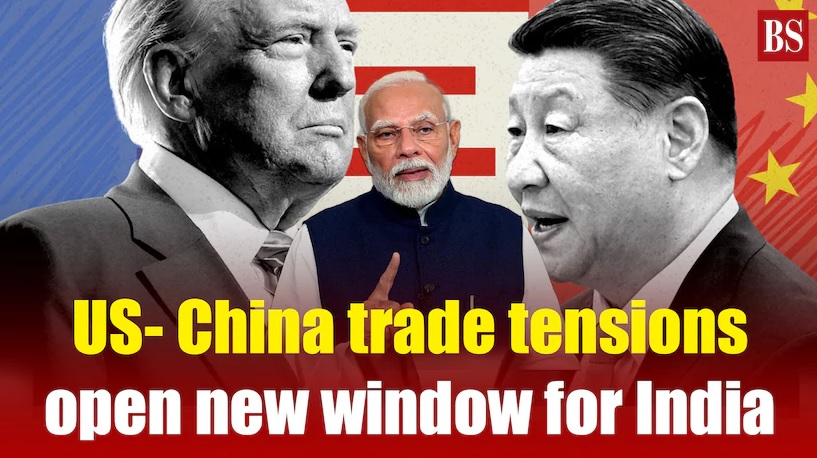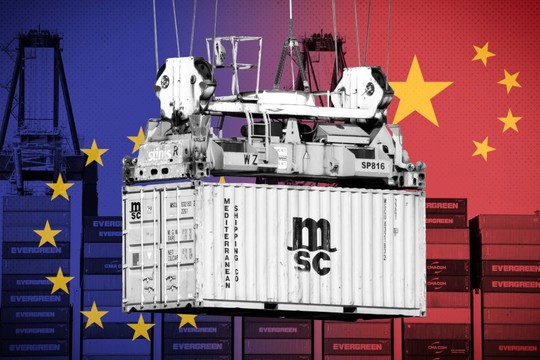FT montage
- Beijing eyes rapprochement with Brussels to compensate for loss of US market but significant hurdles remain
- White House expects UK trade deal ‘within three weeks’
- Unplug China, plug into India: Centre looks to attract US companies planning to exit China
Beijing is looking to deepen ties with the world’s largest trading bloc with the hope of finding alternative markets for its goods in the face of steep US tariffs. China has dispatched trade delegations to European capitals in recent weeks and factories are exploring rerouting goods to the continent’s markets, ‘The Financial Times’ writes.
EU leaders have also publicly expressed the need for greater co-operation, a strong contrast to previous declarations stating a need to “de-risk” supply chains from Beijing.
But a reset in EU-China ties would need to overcome deep differences over China’s huge trade surpluses, the barriers to accessing its own market and Beijing’s tacit support for Russia’s war in Ukraine.
“It is time for China and Europe to start over,” said Zhang Yansheng, a senior researcher at the state-run China Academy of Macroeconomic Research think-tank.Trump’s tariff upheaval “gives us the opportunity to rethink our trade relationship — China should export more to Europe and import more as well”, he added.
Trump has imposed new tariffs of up to 145 per cent on Chinese exports, threatening to curtail the flow of trade between the world’s two biggest economies. Beijing has retaliated with 125 per cent tariffs.
The EU, meanwhile, has been hit by 10 per cent tariffs, which could increase to 20 per cent if talks fail to accommodate Washington’s demands.
Chinese leader Xi Jinping told visiting Spanish Prime Minister Pedro Sánchez last week that China and the EU should “jointly resist unilateral bullying”.
Even European Commission president Ursula von der Leyen, who has been a proponent of “de-risking”, told Chinese premier Li Qiang last week that the two sides should work together to provide “stability and predictability” for the global economy.
China’s commerce ministry has sent trade delegations in recent weeks to events in Stockholm, Budapest, Oslo and Hanover to drum up interest in investing in China, where foreign companies have complained of barriers to market access.
Peter Burnett, chief executive of the China-Britain Business Council, noted that Beijing sent a large delegation to an “Invest in China” event this month at London’s Queen Elizabeth II Centre. “For international business, China is saying you are welcome and we want you to do more,” he said.
But a European business figure familiar with the Chinese delegations said EU governments had little to offer, as many companies were reluctant to invest in China. An EU Chamber of Commerce in China survey last year found that more than a quarter of respondents were pessimistic about their growth potential in China and 44 per cent about their profitability.
Xi is also planning to snub a summit marking 50 years of bilateral ties, while forcing von der Leyen and European Council president António Costa to travel to Beijing in July for a meeting.
“Europe’s relationship with Beijing has been plumbing new lows due to growing trade imbalances, China’s support for Russia and a rise in Chinese cyber attacks across Europe,” said Noah Barkin of the Rhodium Group consultancy. “It is difficult, given this backdrop, to envision some sort of détente between Brussels and Beijing.”
But if trade talks with the US fail to broker any reprieve from tariffs, the EU “could decide that even a bad deal with Beijing is preferable to a two-front trade war with both the US and China”, Barkin added.
China and the EU have also agreed to step up high-level dialogue and negotiations to resolve levies on Chinese electric vehicles.
Beijing can count on some German companies with a significant footprint in China to back closer ties. A policy paper circulated among German corporate representatives in China this week called on the incoming government in Berlin to “play a more active role” in supporting their business interests in the country.
Zhang at the Academy of Macroeconomic Research said there was a “big misunderstanding” last year between China and the EU, noting that a delegation he attended had received a cool reception.
“[Europeans] were looking at China with a biased perspective, they wanted ‘de-risking’ from China’s industrial and supply chains,” he said, though he conceded that the Chinese side was “flexing our muscles too much”.
“China and Europe need to re-understand each other,” he said.
 Pic.: CBC
Pic.: CBC
White House officials believe a trade deal with Britain can be finalised within three weeks, ‘The Telegraph’ can reveal.
An insider familiar with the strategy said London was in a good position for a rapid deal although the UK will likely be in a second wave of announcements, following Japan, India, and South Korea, which Donald Trump wants to reach agreements with in order to isolate China.
A White House official told The Telegraph that meant an agreement was expected “soon”. “Two weeks,” he said, adding: “Or maybe three.”
Steve Bannon, Mr Trump’s former strategist who has been influential in pushing for manufacturing industries to return to American soil, said a deal with the UK would be among the simplest and fastest to negotiate.
“You (Britain) don’t make anything anymore,” he said. “You don’t make anything we’re trying to bring back. That’s why Japan and Korea will be tough.
“Sure you guys make automobiles but it is nothing in the grand scheme of things. They’re kind of bespoke Jaguars and Aston Martins.”

India is moving swiftly to identify and woo US companies looking to relocate their manufacturing from China, to capitalise on an expected global supply chain realignment across sectors including electronics, toys and pharmaceuticals amid an escalating Sino-US tariff war, writes Indian ‘The Economic Times’.
The government is also keen to support Indian corporates to aggressively pursue the US market and recently held a meeting with industry representatives to explore strategies, people privy to the details told ET.
These moves come ahead of virtual negotiations for a bilateral trade agreement (BTA) between New Delhi and Washington, expected to start this week, with face-to-face meetings likely to follow from mid-May.
The Indian electronics industry is sensing a golden opportunity to attract investments.
The US has excluded electronics from steep tariffs it imposed on Chinese-made goods exports while pausing reciprocal tariffs on India and over 75 other countries. US President Donald Trump, however, said he would soon announce fresh tariffs on electronics, including semiconductors.
Industry executives said the government needs to chart out a roadmap with meticulous planning to make the most of the opportunities opened by the US-China trade war. Otherwise, Vietnam may emerge as the biggest beneficiary of the shifting of global supply chains, they warned.
However, given that Vietnam has a large trade surplus with the US and the country has majority of Chinese investments in its manufacturing landscape, there may be opportunities for India, the executives said.
“The government has identified 10-12 sectors like electronics, pharma, chemicals, automobiles, toys, air conditioners, appliances, etc, where India can have a competitive advantage and the sectors will be supported,” the person said.
read more in our Telegram-channel https://t.me/The_International_Affairs

 11:04 18.04.2025 •
11:04 18.04.2025 •























